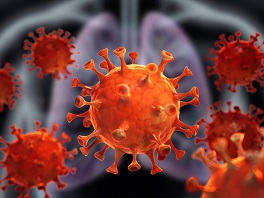Good News! Hong Kong Study Finds That Omicron Variant Replicates 70 Times Faster Than Delta In Windpipe And Lungs! A Mild Variant?
Source: Medical News - Omicron Variant Dec 16, 2021 4 years, 2 months, 4 days, 8 hours, 55 minutes ago
Enough garbage about Omicron being a mild variant! It will be fun in coming weeks and months to see the incidences of viral persistence and also manifestations and seriousness of Long COVID or PASC (Post-Acute Sequelae SARS-CoV-2 Infection) in South Africa (Provided they have a proper and credible medical reporting platform in place and no one is being paid by those controlling the COVID-19 narratives to present manipulated data!)
 A new study by researchers from LKS Faculty of Medicine at The University of Hong Kong (HKUMed) has found that the Omicron or B.1.1.529 variant replicates 70 times faster than the Delta variant in bronchial tissue.
A new study by researchers from LKS Faculty of Medicine at The University of Hong Kong (HKUMed) has found that the Omicron or B.1.1.529 variant replicates 70 times faster than the Delta variant in bronchial tissue.
Please Help! Do Not Ignore Our Appeals For Help. Please support the sustainability of this website and all our research and community initiatives by making a donation to our cause. Your donation helps saves lives directly and indirectly. Every dollar counts. Please Support. Thank You. (We apologize for the constant appeal.)
https://www.thailandmedical.news/p/sponsorship
The study findings may explain why Omicron may transmit faster between humans than previous variants.
The study findings showed that the Omicron infection in the lung is significantly lower than the original SARS-CoV-2, which may be an indicator of lower disease severity but it should not be discounted that this may cause other conditions and also there is a high possibility of long-term health issues.
The study findings are available in a preprint version and the research is currently under peer review for publication.
https://www.med.hku.hk/en/news/press/20211215-omicron-sars-cov-2-infection
The study findings showed that the Omicron variant has been found to multiply about 70 times quicker than the original and Delta versions of coronavirus in tissue samples taken from the bronchus, the main tubes from the windpipe to the lungs, in laboratory experiments that could help explain its rapid transmission.
However, the study also found that the new variant grew 10 times slower in lung tissue, which the authors said could be an indicator of lower disease severity.
Dr Michael Chan Chi-wai, who led the work, said the result needed to be interpreted with caution because severe disease is determined not only by how quickly the virus replicates but also by a person’s immune response and, in particular, whether the immune system goes into overdrive, causing a so-called cytokine storm.
Dr Chan told Thailand
Medical News, “It is also noted that by infecting many more individuals, a very infectious virus may cause more severe disease and death even though the virus itself may be less pathogenic. Therefore, taken together with our recent studies showing that the Omicron variant can partially escape immunity from vaccines and past infection, the overall threat from the Omicron variant is likely to be very significant.”
&
amp;nbsp;
An associate professor of microbiology and immunology at Louisiana State University Health Shreveport, Jeremy Kamil pointed out that Delta, which turned out to be more pathogenic, showed a similar pattern of replicating more slowly in the lungs.
He commented, “The Hong Kong study team found Omicron replicates fantastically well, even far better than either Delta or the original virus in bronchial tissue. This could in some ways contribute to an advantage in spread/transmission between people.”
He added, “Of course, a huge component of Omicron’s transmissibility in real life is going to be its potential to escape neutralizing antibodies that protect against infection in the first place. It’s very likely spreading well even between vaccinated people, especially those who haven’t recently gotten a booster shot.”
The Hog Kong study findings came from experiments using lung tissue samples taken from patients during surgery. By 24 hours, the Omicron variant had replicated about 70 times more than Delta and the original variant.
Though the bronchus is not the upper respiratory system, the study team said this could alarmingly lead to people shedding more virus and passing on infections more easily.
The study findings, together with other recent work showing Omicron infects cells more readily, add to an emerging picture that the variant may be intrinsically more transmissible in addition to evading existing immunity.
Researchers are also studying the pathogenesis of the new Omicron variant as it is now believed that the reasons that it is causing more asymptomatic and mild symptoms initially is because it has effectively evolved to be able to literally “switch off” the human host immune response by disrupting various immune and cellular pathways. Contrary to stupid assumptions that the manifestation of asymptomatic or mild conditions is a good thing, it alarmingly raises the prospects of viral persistence and also the increased risk of more long-term health complications and conditions. Some experts are now even proposing that the Omicron is better at creating better immunodeficiency conditions than even the HIV virus and this is something that needs to be verified with more research.
Please Help! Do Not Ignore Our Appeals For Help. Please support the sustainability of this website and all our research and community initiatives by making a donation to our cause. Your donation helps saves lives directly and indirectly. Every dollar counts. Please Support. Thank You. (We apologize for the constant appeal.)
https://www.thailandmedical.news/p/sponsorship
For the latest on the Omicron variant, keep on logging to Thailand Medical News.
